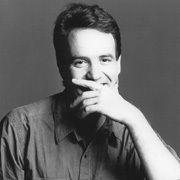
Robert Lord
Playwright Roger Hall has written of Robert Lord that he "loved to write. Always there were scripts on the go: for television, for theatre, for radio, for films". After Lord's death in 1992, Hall wrote in North and South that Lord's career had combined great success — including several plays produced overseas — with near-misses and "never enough luck". The Oxford Companion to New Zealand Literature called Lord "New Zealand's first professional playwright".
Born in Rotorua in 1945, Lord studied arts at Otago and Victoria Universities. In 1969, he won the Katherine Mansfield short story contest, but soon shifted his attention to writing stage plays. He was also working as a primary school teacher. Lord's students helped inspire his first work for the screen. The freewheeling Day We Landed on the Most Perfect Planet in the Universe spun off the imaginings of his students, who were interviewed about freedom and saw some of their ideas bought to life. Lord wrote the script with Michael Heath. It screened on television's Survey slot in 1971.
From 1971 to 1975, five of Lord's plays debuted in Kiwi theatres, including hit farce Well Hung (1974), which was inspired by the police investigation into the murders of Harvey and Jeanette Crewe. Roger Hall compared it favourably to the work of English playwright Joe Orton. Lord was one of the only Kiwi playwrights to touch on homosexuality in the 1970s; Balance of Payments (1972) featured a couple who live off the earnings of their rent-boy son, while Meeting Places included some homosexual elements.
From 1975 to 1987, Lord lived in New York; over the next 13 years he would write plays set in both New Zealand and America.
The evolution of Bert and Maisy, Lord's only TV series, illustrates the ups and downs of the writer's life. Begun as a stage play, it was rejected by theatres then critics, after a season in Christchurch under the title Unfamiliar Steps. An award in the United States helped turn things around. Lord felt that his gentle satire of an older couple might make a "funny and touching" movie. Producer John O'Shea agreed, but the NZ Film Commission was unconvinced. A radio version was cancelled while Lord was still writing it.
When TVNZ drama boss Brian Bell read the scripts, he approved a TV series. Fresh from the original stage production, Grant Tilly and Close to Home's Alice Fraser starred as an ageing middle class couple coping with life, including moving into a smaller home and the stresses of negotiating a family Christmas. Fraser argued that Lord's "initial concern was to get across the fact there's a lot of dignity in growing old".
Lord had already worked with O'Shea on the script for feature film Pictures, inspired by 19th century photographers the Burton Brothers. After a gruelling location shoot, it won an award for humanism at the 1981 Moscow Film Festival.
Lord also wrote four episodes of 60s-set series Peppermint Twist (the show was cancelled before two of his episodes could be shot). He argued that the show would have benefited from more time in development — and admitted that writing an episode featuring 8000 rabbits might have been pushing things too far. Roger Hall has argued that Peppermint Twist was "admirably suited" to Lord's "stylish, offbeat" style of humour.
Reviewing Lord's hit play The Affair in 1988, Simon Bennett compared it to the work of Roger Hall in terms of being "truly popular theatre". Bennett argued that both Lord and Hall "hold a mirror to society exposing its foibles and pettinesses; they provide entertainment and cathartic release through laughter . . . and they put bums on seats."
Robert Lord died on 7 January 1992 of an AIDS-related illness. Joyful and Triumphant, seen by many as his greatest achievement, debuted at the Wellington Arts Festival the following month. Chronicling a family — and changes in Kiwi society — over 40 years of Christmas days, it toured Australasia, and was adapted for television in 1993.
The Robert Lord Diaries was published in October 2023. Compiling diary entries across 18 years, the book contrasts provincial New Zealand with Lord's life as a gay man in the excitement of 1970s and 80s New York.
Profile written by Ian Pryor; updated on 13 October 2023
Sources include
Chris Brickell, Vanessa Manhire and Nonnita Rees (editors), Robert Lord Diaries (Otago University Press: Dunedin, 2023)
'Robert Lord 1945 - 1992' Playmarket website. Accessed 11 October 2023
Simon Bennett, 'Towards a Popular Theatre?' (Review of The Affair) - Illusions 9, December 1988, page 11
Merrill Coke, 'Lord's Busy Year' (Interview) - OnFilm, December 1987, page 49
Simon Garrett, 'LORD, Robert' in The Oxford Companion to New Zealand Literature. Editors Roger Robinson and Nelson Wattie (Auckland: Oxford University Press, 1998)
Roger Hall, 'Robert Lord - Last Lines' - North and South, April 1992, page 14
Howard McNaughton, 'Drama' chapter in The Oxford History of New Zealand Literature in English, Editor Terry Sturm (Auckland: Oxford University Press, Second Edition, 1998)
John Reid, Whatever It Takes - Pacific Films and John O’Shea 1948 - 2000 (Wellington: Victoria University Press, 2018)
Special correspondent, 'Story about old people 'funny and moving' - The Star (Television Guide pullout) - 28 July 1998, page 6
John Reid and Ruth Jeffrey (editors) Circa 1976 - 1996 (GP Print: Wellington, 1996)